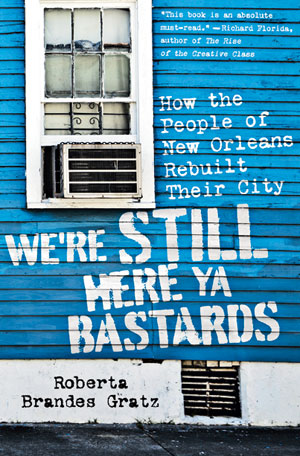A crisis is a moment of reckoning. By altering or destroying the status quo, a crisis opens things up, making visible what is often submerged, making possible what is usually thought otherwise. In 2005, Hurricane Katrina laid bare the deep inequalities in the city of New Orleans, while clearing paths for reform and change. In her new book, Roberta Brandes Gratz tracks efforts to reshape the city in the wake of the storm.
Gratz is a self-proclaimed urbanist in the tradition of Jane Jacobs, and here, as in her previous books, she scours the city for stories of grassroots activism. She ably describes multiple frames of reference'historic preservation, infrastructure, crime, sustainability, public health, education, and planning'in order to outline a constellation of interconnected issues, showing how the physical shape of the city reflects its politics and policies.
But while the issues change, Gratz's approach stays the same: these are stories of heroes and villains, of individual resilience against structural ineptitude. As she writes, 'The story of the regeneration of New Orleans after the storm is filled with tales of the impossible being accomplished by those too na've to know that it 'can't be done,' or those determined to just do it and ask permission afterward.' She includes accounts of the revival of local preservation efforts, the proliferation of sustainable building techniques, and the beginnings of environmental remediation in the surrounding bayou. Particularly in the most devastated areas, Katrina provided an impetus to rethink the city at the level of the individual house and block, with numerous formal and informal organizations emerging to promote responsible, sustainable growth.
As the book progresses, however, Gratz's resilient individuals come up against larger forces. She is repeatedly appalled at the ineptitude and corruption of those in charge. This is most apparent in two chapters on the demise, following Katrina, of the Charity Hospital and the city's 1930s-era public housing; both had long served as important safety nets for poor New Orleanians; both sustained minimal damage during the storm; both have been effectively dismantled by politicians and business interests determined to use the crisis as an excuse for redevelopment and the privatization of formerly public services.
In these cases, the battered ideals of transparency, democracy, and community participation were simply overpowered. It is surprising that Gratz seems startled by the failures of 'experts' and others to judiciously conserve these vital supports for an underserved community. While the house or the city block might be revived, entities like hospitals and housing (and highways and levees) are huge undertakings that reflect the priorities, capabilities, and values of a society; they are formed at a scale beyond the capabilities of any ordinary individual. Gratz brilliantly exposes a complex web of injustice, but her book also conveys the looming sense that reforming the inequalities inscribed on the streets of New Orleans and elsewhere will require a more fundamental reevaluation of what constitutes our idea of the just city and the public good.
Aleksandr Bierig is a Ph.D. student at Harvard's GSD.


Post a comment to this article
Report Abusive Comment